Detailed Report: Strategies for the Travel and Tourism Business
VerifiedAdded on 2023/01/07
|14
|4313
|34
Report
AI Summary
This report provides a comprehensive analysis of the travel and tourism business, covering essential aspects such as revenue management, human resources strategies, and legal and ethical considerations. It explores the principles of revenue management, including market segmentation, pricing strategies, and demand forecasting, highlighting their impact on profitability. The report also delves into human resource management, focusing on the human resources lifecycle and strategies. Furthermore, it examines the importance of legal and ethical considerations in the industry. Additionally, the report discusses the significance of financial records, budget management, and statistical analysis in the travel and tourism sector, emphasizing the role of financial statements and budgeting in decision-making. The report underscores the need for effective financial planning and control to achieve business objectives in the competitive travel and tourism environment.
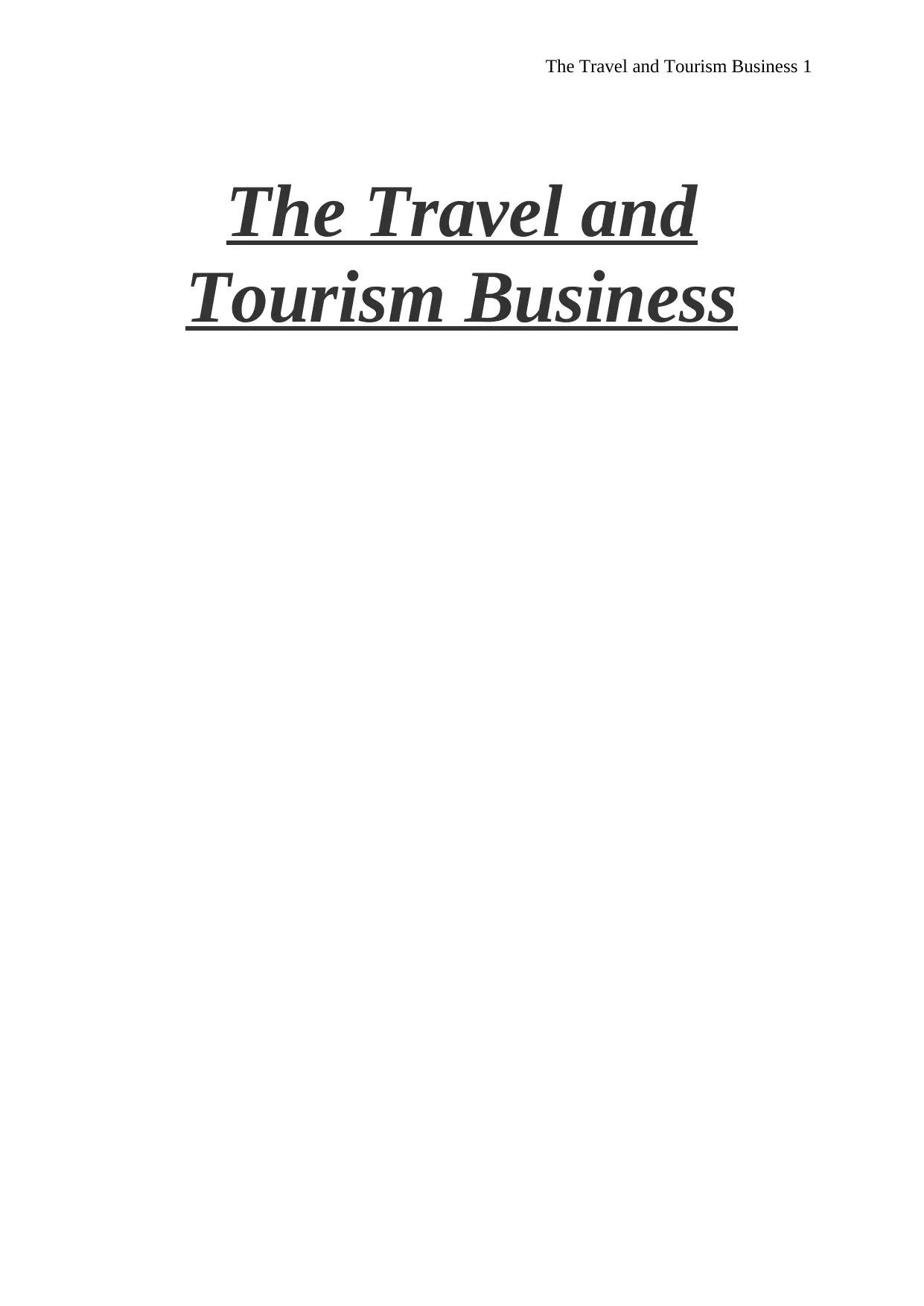
The Travel and Tourism Business 1
The Travel and
Tourism Business
The Travel and
Tourism Business
Paraphrase This Document
Need a fresh take? Get an instant paraphrase of this document with our AI Paraphraser
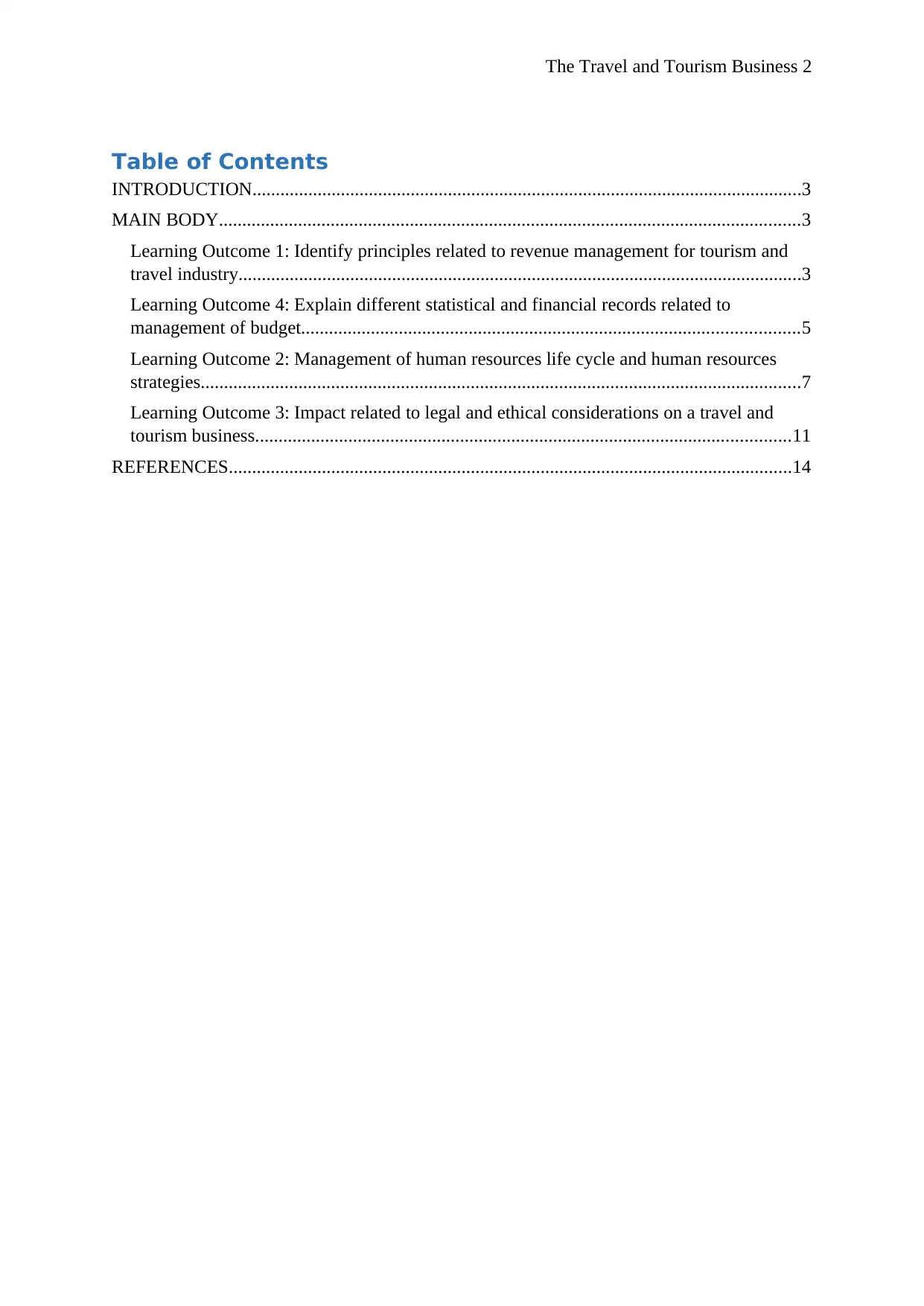
The Travel and Tourism Business 2
Table of Contents
INTRODUCTION......................................................................................................................3
MAIN BODY.............................................................................................................................3
Learning Outcome 1: Identify principles related to revenue management for tourism and
travel industry.........................................................................................................................3
Learning Outcome 4: Explain different statistical and financial records related to
management of budget...........................................................................................................5
Learning Outcome 2: Management of human resources life cycle and human resources
strategies.................................................................................................................................7
Learning Outcome 3: Impact related to legal and ethical considerations on a travel and
tourism business...................................................................................................................11
REFERENCES.........................................................................................................................14
Table of Contents
INTRODUCTION......................................................................................................................3
MAIN BODY.............................................................................................................................3
Learning Outcome 1: Identify principles related to revenue management for tourism and
travel industry.........................................................................................................................3
Learning Outcome 4: Explain different statistical and financial records related to
management of budget...........................................................................................................5
Learning Outcome 2: Management of human resources life cycle and human resources
strategies.................................................................................................................................7
Learning Outcome 3: Impact related to legal and ethical considerations on a travel and
tourism business...................................................................................................................11
REFERENCES.........................................................................................................................14
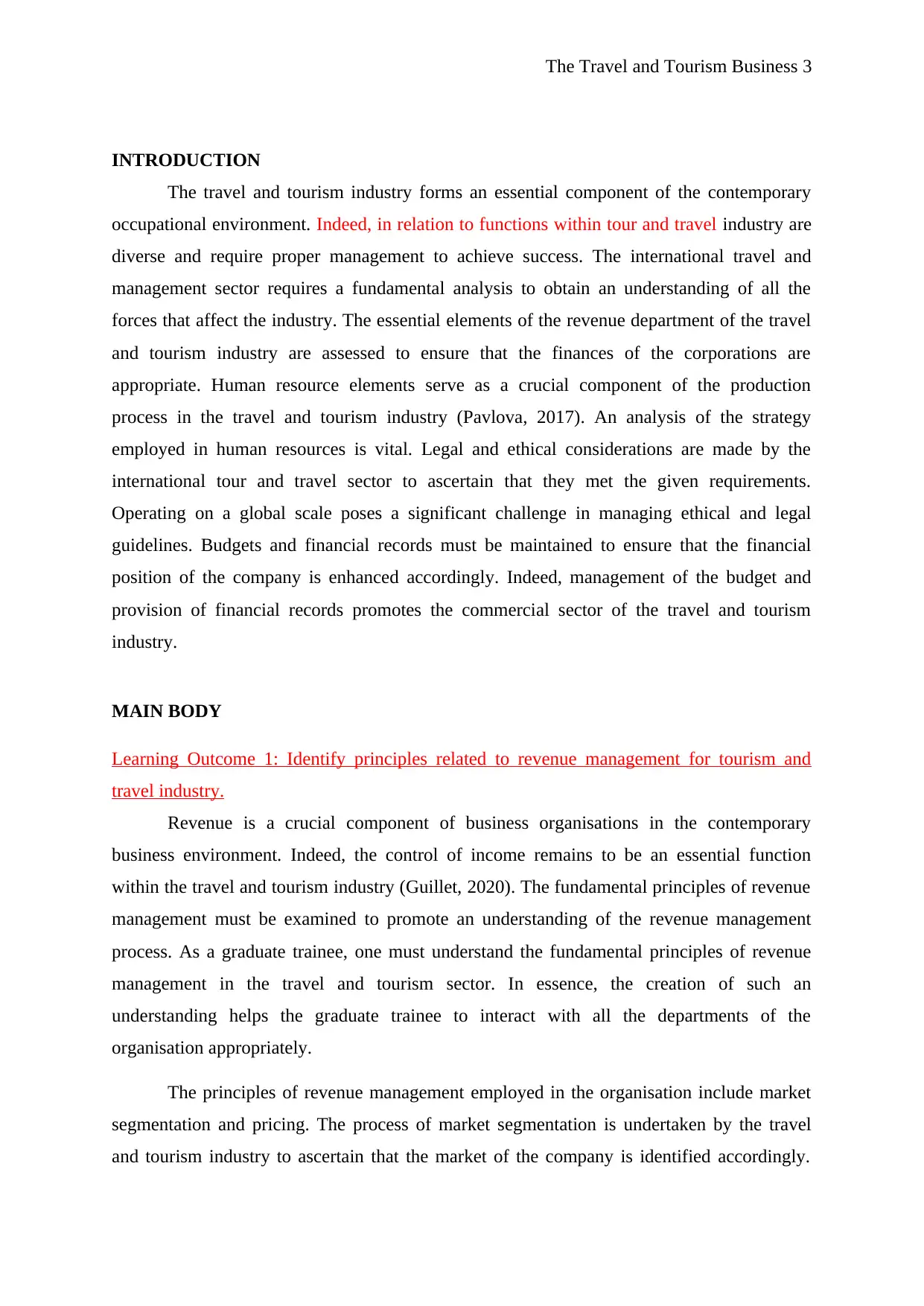
The Travel and Tourism Business 3
INTRODUCTION
The travel and tourism industry forms an essential component of the contemporary
occupational environment. Indeed, in relation to functions within tour and travel industry are
diverse and require proper management to achieve success. The international travel and
management sector requires a fundamental analysis to obtain an understanding of all the
forces that affect the industry. The essential elements of the revenue department of the travel
and tourism industry are assessed to ensure that the finances of the corporations are
appropriate. Human resource elements serve as a crucial component of the production
process in the travel and tourism industry (Pavlova, 2017). An analysis of the strategy
employed in human resources is vital. Legal and ethical considerations are made by the
international tour and travel sector to ascertain that they met the given requirements.
Operating on a global scale poses a significant challenge in managing ethical and legal
guidelines. Budgets and financial records must be maintained to ensure that the financial
position of the company is enhanced accordingly. Indeed, management of the budget and
provision of financial records promotes the commercial sector of the travel and tourism
industry.
MAIN BODY
Learning Outcome 1: Identify principles related to revenue management for tourism and
travel industry.
Revenue is a crucial component of business organisations in the contemporary
business environment. Indeed, the control of income remains to be an essential function
within the travel and tourism industry (Guillet, 2020). The fundamental principles of revenue
management must be examined to promote an understanding of the revenue management
process. As a graduate trainee, one must understand the fundamental principles of revenue
management in the travel and tourism sector. In essence, the creation of such an
understanding helps the graduate trainee to interact with all the departments of the
organisation appropriately.
The principles of revenue management employed in the organisation include market
segmentation and pricing. The process of market segmentation is undertaken by the travel
and tourism industry to ascertain that the market of the company is identified accordingly.
INTRODUCTION
The travel and tourism industry forms an essential component of the contemporary
occupational environment. Indeed, in relation to functions within tour and travel industry are
diverse and require proper management to achieve success. The international travel and
management sector requires a fundamental analysis to obtain an understanding of all the
forces that affect the industry. The essential elements of the revenue department of the travel
and tourism industry are assessed to ensure that the finances of the corporations are
appropriate. Human resource elements serve as a crucial component of the production
process in the travel and tourism industry (Pavlova, 2017). An analysis of the strategy
employed in human resources is vital. Legal and ethical considerations are made by the
international tour and travel sector to ascertain that they met the given requirements.
Operating on a global scale poses a significant challenge in managing ethical and legal
guidelines. Budgets and financial records must be maintained to ensure that the financial
position of the company is enhanced accordingly. Indeed, management of the budget and
provision of financial records promotes the commercial sector of the travel and tourism
industry.
MAIN BODY
Learning Outcome 1: Identify principles related to revenue management for tourism and
travel industry.
Revenue is a crucial component of business organisations in the contemporary
business environment. Indeed, the control of income remains to be an essential function
within the travel and tourism industry (Guillet, 2020). The fundamental principles of revenue
management must be examined to promote an understanding of the revenue management
process. As a graduate trainee, one must understand the fundamental principles of revenue
management in the travel and tourism sector. In essence, the creation of such an
understanding helps the graduate trainee to interact with all the departments of the
organisation appropriately.
The principles of revenue management employed in the organisation include market
segmentation and pricing. The process of market segmentation is undertaken by the travel
and tourism industry to ascertain that the market of the company is identified accordingly.
⊘ This is a preview!⊘
Do you want full access?
Subscribe today to unlock all pages.

Trusted by 1+ million students worldwide
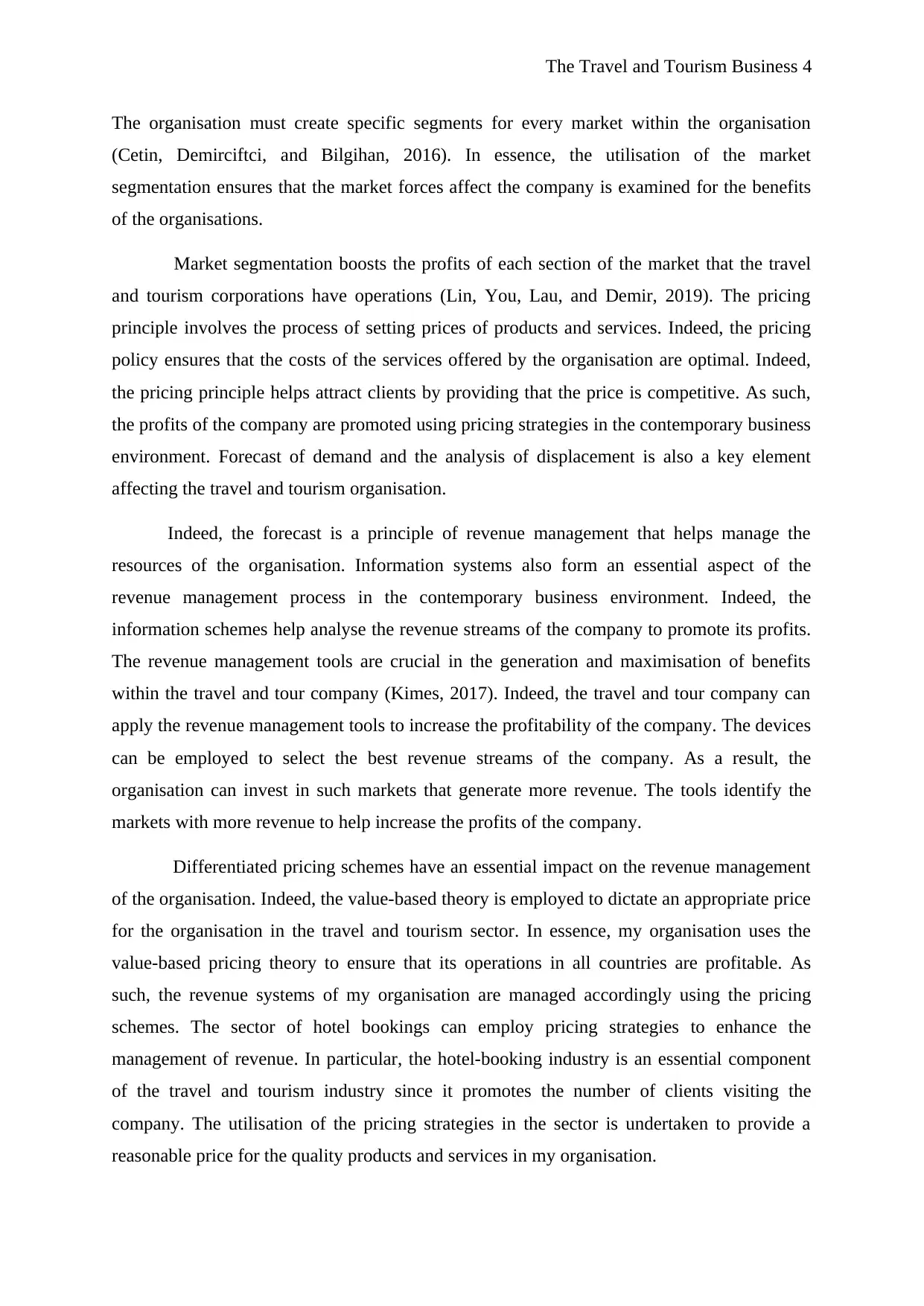
The Travel and Tourism Business 4
The organisation must create specific segments for every market within the organisation
(Cetin, Demirciftci, and Bilgihan, 2016). In essence, the utilisation of the market
segmentation ensures that the market forces affect the company is examined for the benefits
of the organisations.
Market segmentation boosts the profits of each section of the market that the travel
and tourism corporations have operations (Lin, You, Lau, and Demir, 2019). The pricing
principle involves the process of setting prices of products and services. Indeed, the pricing
policy ensures that the costs of the services offered by the organisation are optimal. Indeed,
the pricing principle helps attract clients by providing that the price is competitive. As such,
the profits of the company are promoted using pricing strategies in the contemporary business
environment. Forecast of demand and the analysis of displacement is also a key element
affecting the travel and tourism organisation.
Indeed, the forecast is a principle of revenue management that helps manage the
resources of the organisation. Information systems also form an essential aspect of the
revenue management process in the contemporary business environment. Indeed, the
information schemes help analyse the revenue streams of the company to promote its profits.
The revenue management tools are crucial in the generation and maximisation of benefits
within the travel and tour company (Kimes, 2017). Indeed, the travel and tour company can
apply the revenue management tools to increase the profitability of the company. The devices
can be employed to select the best revenue streams of the company. As a result, the
organisation can invest in such markets that generate more revenue. The tools identify the
markets with more revenue to help increase the profits of the company.
Differentiated pricing schemes have an essential impact on the revenue management
of the organisation. Indeed, the value-based theory is employed to dictate an appropriate price
for the organisation in the travel and tourism sector. In essence, my organisation uses the
value-based pricing theory to ensure that its operations in all countries are profitable. As
such, the revenue systems of my organisation are managed accordingly using the pricing
schemes. The sector of hotel bookings can employ pricing strategies to enhance the
management of revenue. In particular, the hotel-booking industry is an essential component
of the travel and tourism industry since it promotes the number of clients visiting the
company. The utilisation of the pricing strategies in the sector is undertaken to provide a
reasonable price for the quality products and services in my organisation.
The organisation must create specific segments for every market within the organisation
(Cetin, Demirciftci, and Bilgihan, 2016). In essence, the utilisation of the market
segmentation ensures that the market forces affect the company is examined for the benefits
of the organisations.
Market segmentation boosts the profits of each section of the market that the travel
and tourism corporations have operations (Lin, You, Lau, and Demir, 2019). The pricing
principle involves the process of setting prices of products and services. Indeed, the pricing
policy ensures that the costs of the services offered by the organisation are optimal. Indeed,
the pricing principle helps attract clients by providing that the price is competitive. As such,
the profits of the company are promoted using pricing strategies in the contemporary business
environment. Forecast of demand and the analysis of displacement is also a key element
affecting the travel and tourism organisation.
Indeed, the forecast is a principle of revenue management that helps manage the
resources of the organisation. Information systems also form an essential aspect of the
revenue management process in the contemporary business environment. Indeed, the
information schemes help analyse the revenue streams of the company to promote its profits.
The revenue management tools are crucial in the generation and maximisation of benefits
within the travel and tour company (Kimes, 2017). Indeed, the travel and tour company can
apply the revenue management tools to increase the profitability of the company. The devices
can be employed to select the best revenue streams of the company. As a result, the
organisation can invest in such markets that generate more revenue. The tools identify the
markets with more revenue to help increase the profits of the company.
Differentiated pricing schemes have an essential impact on the revenue management
of the organisation. Indeed, the value-based theory is employed to dictate an appropriate price
for the organisation in the travel and tourism sector. In essence, my organisation uses the
value-based pricing theory to ensure that its operations in all countries are profitable. As
such, the revenue systems of my organisation are managed accordingly using the pricing
schemes. The sector of hotel bookings can employ pricing strategies to enhance the
management of revenue. In particular, the hotel-booking industry is an essential component
of the travel and tourism industry since it promotes the number of clients visiting the
company. The utilisation of the pricing strategies in the sector is undertaken to provide a
reasonable price for the quality products and services in my organisation.
Paraphrase This Document
Need a fresh take? Get an instant paraphrase of this document with our AI Paraphraser
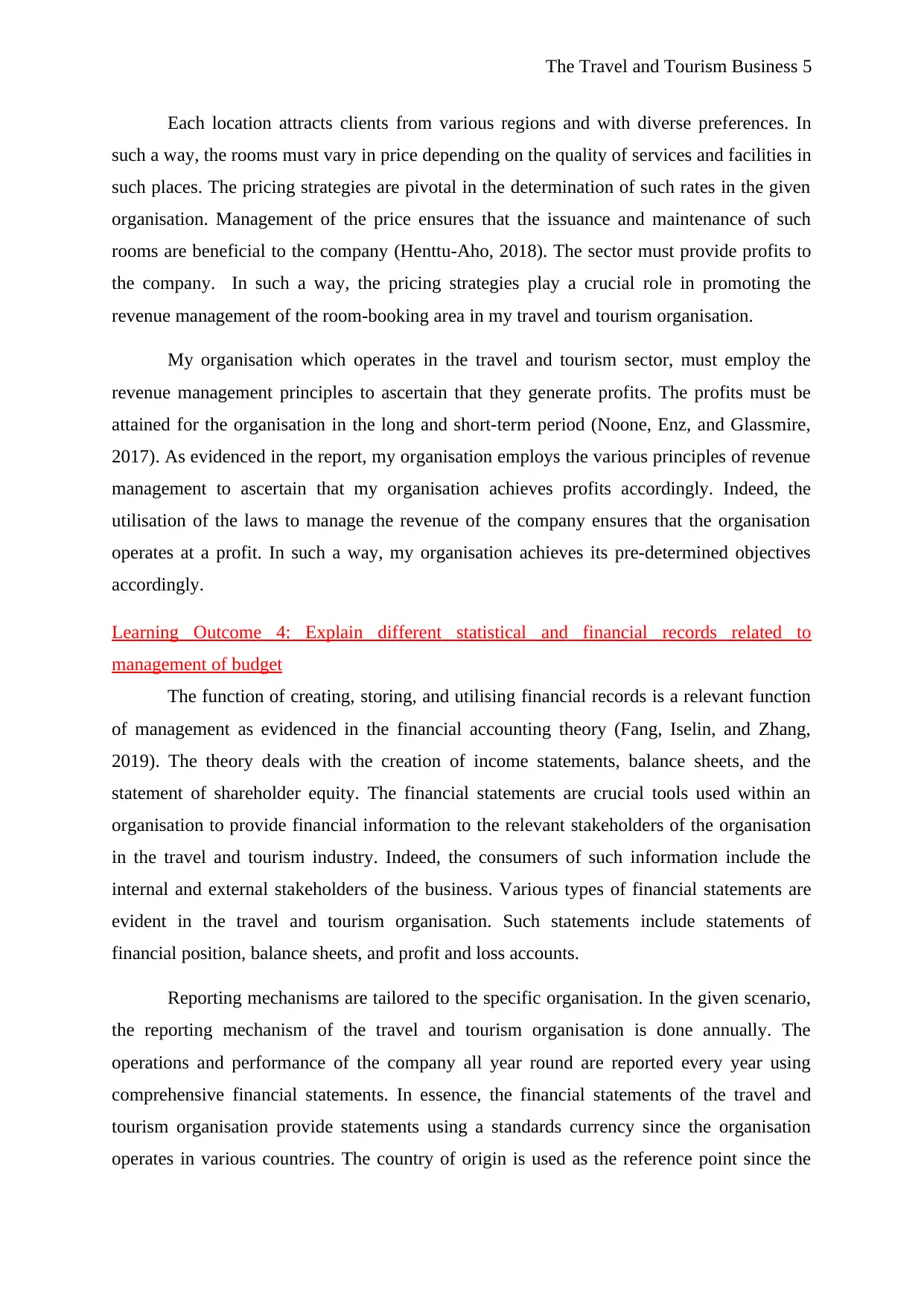
The Travel and Tourism Business 5
Each location attracts clients from various regions and with diverse preferences. In
such a way, the rooms must vary in price depending on the quality of services and facilities in
such places. The pricing strategies are pivotal in the determination of such rates in the given
organisation. Management of the price ensures that the issuance and maintenance of such
rooms are beneficial to the company (Henttu-Aho, 2018). The sector must provide profits to
the company. In such a way, the pricing strategies play a crucial role in promoting the
revenue management of the room-booking area in my travel and tourism organisation.
My organisation which operates in the travel and tourism sector, must employ the
revenue management principles to ascertain that they generate profits. The profits must be
attained for the organisation in the long and short-term period (Noone, Enz, and Glassmire,
2017). As evidenced in the report, my organisation employs the various principles of revenue
management to ascertain that my organisation achieves profits accordingly. Indeed, the
utilisation of the laws to manage the revenue of the company ensures that the organisation
operates at a profit. In such a way, my organisation achieves its pre-determined objectives
accordingly.
Learning Outcome 4: Explain different statistical and financial records related to
management of budget
The function of creating, storing, and utilising financial records is a relevant function
of management as evidenced in the financial accounting theory (Fang, Iselin, and Zhang,
2019). The theory deals with the creation of income statements, balance sheets, and the
statement of shareholder equity. The financial statements are crucial tools used within an
organisation to provide financial information to the relevant stakeholders of the organisation
in the travel and tourism industry. Indeed, the consumers of such information include the
internal and external stakeholders of the business. Various types of financial statements are
evident in the travel and tourism organisation. Such statements include statements of
financial position, balance sheets, and profit and loss accounts.
Reporting mechanisms are tailored to the specific organisation. In the given scenario,
the reporting mechanism of the travel and tourism organisation is done annually. The
operations and performance of the company all year round are reported every year using
comprehensive financial statements. In essence, the financial statements of the travel and
tourism organisation provide statements using a standards currency since the organisation
operates in various countries. The country of origin is used as the reference point since the
Each location attracts clients from various regions and with diverse preferences. In
such a way, the rooms must vary in price depending on the quality of services and facilities in
such places. The pricing strategies are pivotal in the determination of such rates in the given
organisation. Management of the price ensures that the issuance and maintenance of such
rooms are beneficial to the company (Henttu-Aho, 2018). The sector must provide profits to
the company. In such a way, the pricing strategies play a crucial role in promoting the
revenue management of the room-booking area in my travel and tourism organisation.
My organisation which operates in the travel and tourism sector, must employ the
revenue management principles to ascertain that they generate profits. The profits must be
attained for the organisation in the long and short-term period (Noone, Enz, and Glassmire,
2017). As evidenced in the report, my organisation employs the various principles of revenue
management to ascertain that my organisation achieves profits accordingly. Indeed, the
utilisation of the laws to manage the revenue of the company ensures that the organisation
operates at a profit. In such a way, my organisation achieves its pre-determined objectives
accordingly.
Learning Outcome 4: Explain different statistical and financial records related to
management of budget
The function of creating, storing, and utilising financial records is a relevant function
of management as evidenced in the financial accounting theory (Fang, Iselin, and Zhang,
2019). The theory deals with the creation of income statements, balance sheets, and the
statement of shareholder equity. The financial statements are crucial tools used within an
organisation to provide financial information to the relevant stakeholders of the organisation
in the travel and tourism industry. Indeed, the consumers of such information include the
internal and external stakeholders of the business. Various types of financial statements are
evident in the travel and tourism organisation. Such statements include statements of
financial position, balance sheets, and profit and loss accounts.
Reporting mechanisms are tailored to the specific organisation. In the given scenario,
the reporting mechanism of the travel and tourism organisation is done annually. The
operations and performance of the company all year round are reported every year using
comprehensive financial statements. In essence, the financial statements of the travel and
tourism organisation provide statements using a standards currency since the organisation
operates in various countries. The country of origin is used as the reference point since the
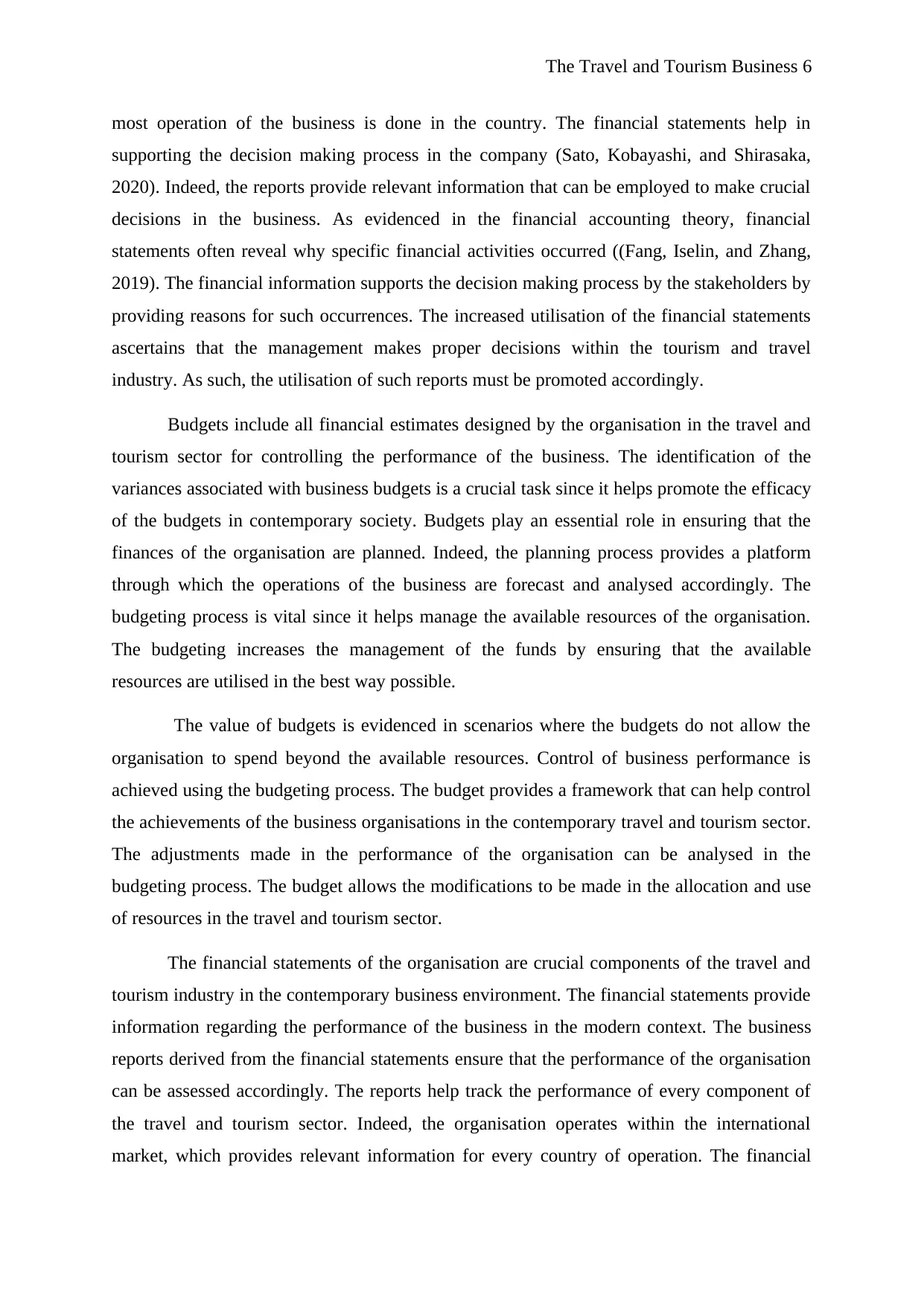
The Travel and Tourism Business 6
most operation of the business is done in the country. The financial statements help in
supporting the decision making process in the company (Sato, Kobayashi, and Shirasaka,
2020). Indeed, the reports provide relevant information that can be employed to make crucial
decisions in the business. As evidenced in the financial accounting theory, financial
statements often reveal why specific financial activities occurred ((Fang, Iselin, and Zhang,
2019). The financial information supports the decision making process by the stakeholders by
providing reasons for such occurrences. The increased utilisation of the financial statements
ascertains that the management makes proper decisions within the tourism and travel
industry. As such, the utilisation of such reports must be promoted accordingly.
Budgets include all financial estimates designed by the organisation in the travel and
tourism sector for controlling the performance of the business. The identification of the
variances associated with business budgets is a crucial task since it helps promote the efficacy
of the budgets in contemporary society. Budgets play an essential role in ensuring that the
finances of the organisation are planned. Indeed, the planning process provides a platform
through which the operations of the business are forecast and analysed accordingly. The
budgeting process is vital since it helps manage the available resources of the organisation.
The budgeting increases the management of the funds by ensuring that the available
resources are utilised in the best way possible.
The value of budgets is evidenced in scenarios where the budgets do not allow the
organisation to spend beyond the available resources. Control of business performance is
achieved using the budgeting process. The budget provides a framework that can help control
the achievements of the business organisations in the contemporary travel and tourism sector.
The adjustments made in the performance of the organisation can be analysed in the
budgeting process. The budget allows the modifications to be made in the allocation and use
of resources in the travel and tourism sector.
The financial statements of the organisation are crucial components of the travel and
tourism industry in the contemporary business environment. The financial statements provide
information regarding the performance of the business in the modern context. The business
reports derived from the financial statements ensure that the performance of the organisation
can be assessed accordingly. The reports help track the performance of every component of
the travel and tourism sector. Indeed, the organisation operates within the international
market, which provides relevant information for every country of operation. The financial
most operation of the business is done in the country. The financial statements help in
supporting the decision making process in the company (Sato, Kobayashi, and Shirasaka,
2020). Indeed, the reports provide relevant information that can be employed to make crucial
decisions in the business. As evidenced in the financial accounting theory, financial
statements often reveal why specific financial activities occurred ((Fang, Iselin, and Zhang,
2019). The financial information supports the decision making process by the stakeholders by
providing reasons for such occurrences. The increased utilisation of the financial statements
ascertains that the management makes proper decisions within the tourism and travel
industry. As such, the utilisation of such reports must be promoted accordingly.
Budgets include all financial estimates designed by the organisation in the travel and
tourism sector for controlling the performance of the business. The identification of the
variances associated with business budgets is a crucial task since it helps promote the efficacy
of the budgets in contemporary society. Budgets play an essential role in ensuring that the
finances of the organisation are planned. Indeed, the planning process provides a platform
through which the operations of the business are forecast and analysed accordingly. The
budgeting process is vital since it helps manage the available resources of the organisation.
The budgeting increases the management of the funds by ensuring that the available
resources are utilised in the best way possible.
The value of budgets is evidenced in scenarios where the budgets do not allow the
organisation to spend beyond the available resources. Control of business performance is
achieved using the budgeting process. The budget provides a framework that can help control
the achievements of the business organisations in the contemporary travel and tourism sector.
The adjustments made in the performance of the organisation can be analysed in the
budgeting process. The budget allows the modifications to be made in the allocation and use
of resources in the travel and tourism sector.
The financial statements of the organisation are crucial components of the travel and
tourism industry in the contemporary business environment. The financial statements provide
information regarding the performance of the business in the modern context. The business
reports derived from the financial statements ensure that the performance of the organisation
can be assessed accordingly. The reports help track the performance of every component of
the travel and tourism sector. Indeed, the organisation operates within the international
market, which provides relevant information for every country of operation. The financial
⊘ This is a preview!⊘
Do you want full access?
Subscribe today to unlock all pages.

Trusted by 1+ million students worldwide
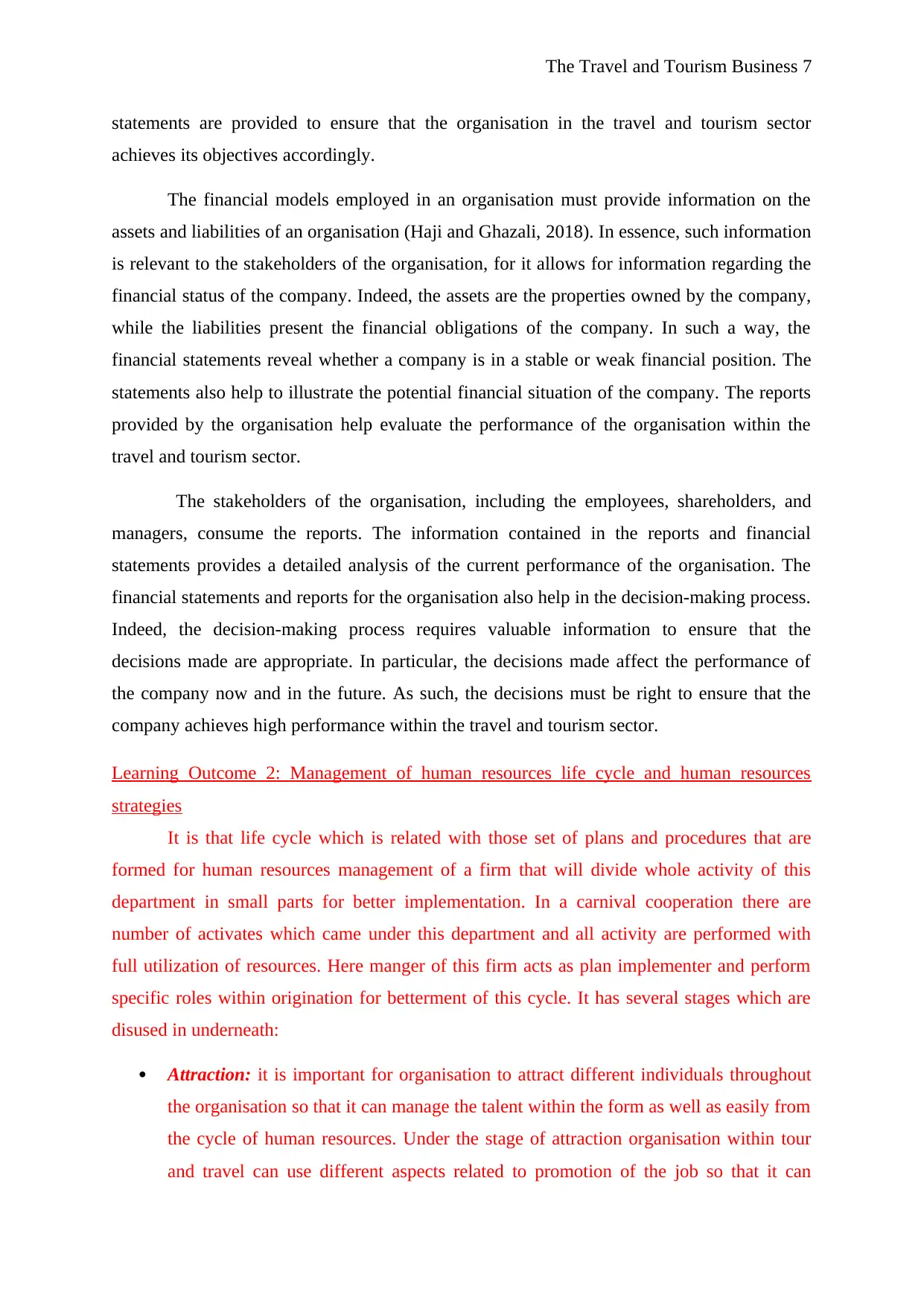
The Travel and Tourism Business 7
statements are provided to ensure that the organisation in the travel and tourism sector
achieves its objectives accordingly.
The financial models employed in an organisation must provide information on the
assets and liabilities of an organisation (Haji and Ghazali, 2018). In essence, such information
is relevant to the stakeholders of the organisation, for it allows for information regarding the
financial status of the company. Indeed, the assets are the properties owned by the company,
while the liabilities present the financial obligations of the company. In such a way, the
financial statements reveal whether a company is in a stable or weak financial position. The
statements also help to illustrate the potential financial situation of the company. The reports
provided by the organisation help evaluate the performance of the organisation within the
travel and tourism sector.
The stakeholders of the organisation, including the employees, shareholders, and
managers, consume the reports. The information contained in the reports and financial
statements provides a detailed analysis of the current performance of the organisation. The
financial statements and reports for the organisation also help in the decision-making process.
Indeed, the decision-making process requires valuable information to ensure that the
decisions made are appropriate. In particular, the decisions made affect the performance of
the company now and in the future. As such, the decisions must be right to ensure that the
company achieves high performance within the travel and tourism sector.
Learning Outcome 2: Management of human resources life cycle and human resources
strategies
It is that life cycle which is related with those set of plans and procedures that are
formed for human resources management of a firm that will divide whole activity of this
department in small parts for better implementation. In a carnival cooperation there are
number of activates which came under this department and all activity are performed with
full utilization of resources. Here manger of this firm acts as plan implementer and perform
specific roles within origination for betterment of this cycle. It has several stages which are
disused in underneath:
Attraction: it is important for organisation to attract different individuals throughout
the organisation so that it can manage the talent within the form as well as easily from
the cycle of human resources. Under the stage of attraction organisation within tour
and travel can use different aspects related to promotion of the job so that it can
statements are provided to ensure that the organisation in the travel and tourism sector
achieves its objectives accordingly.
The financial models employed in an organisation must provide information on the
assets and liabilities of an organisation (Haji and Ghazali, 2018). In essence, such information
is relevant to the stakeholders of the organisation, for it allows for information regarding the
financial status of the company. Indeed, the assets are the properties owned by the company,
while the liabilities present the financial obligations of the company. In such a way, the
financial statements reveal whether a company is in a stable or weak financial position. The
statements also help to illustrate the potential financial situation of the company. The reports
provided by the organisation help evaluate the performance of the organisation within the
travel and tourism sector.
The stakeholders of the organisation, including the employees, shareholders, and
managers, consume the reports. The information contained in the reports and financial
statements provides a detailed analysis of the current performance of the organisation. The
financial statements and reports for the organisation also help in the decision-making process.
Indeed, the decision-making process requires valuable information to ensure that the
decisions made are appropriate. In particular, the decisions made affect the performance of
the company now and in the future. As such, the decisions must be right to ensure that the
company achieves high performance within the travel and tourism sector.
Learning Outcome 2: Management of human resources life cycle and human resources
strategies
It is that life cycle which is related with those set of plans and procedures that are
formed for human resources management of a firm that will divide whole activity of this
department in small parts for better implementation. In a carnival cooperation there are
number of activates which came under this department and all activity are performed with
full utilization of resources. Here manger of this firm acts as plan implementer and perform
specific roles within origination for betterment of this cycle. It has several stages which are
disused in underneath:
Attraction: it is important for organisation to attract different individuals throughout
the organisation so that it can manage the talent within the form as well as easily from
the cycle of human resources. Under the stage of attraction organisation within tour
and travel can use different aspects related to promotion of the job so that it can
Paraphrase This Document
Need a fresh take? Get an instant paraphrase of this document with our AI Paraphraser
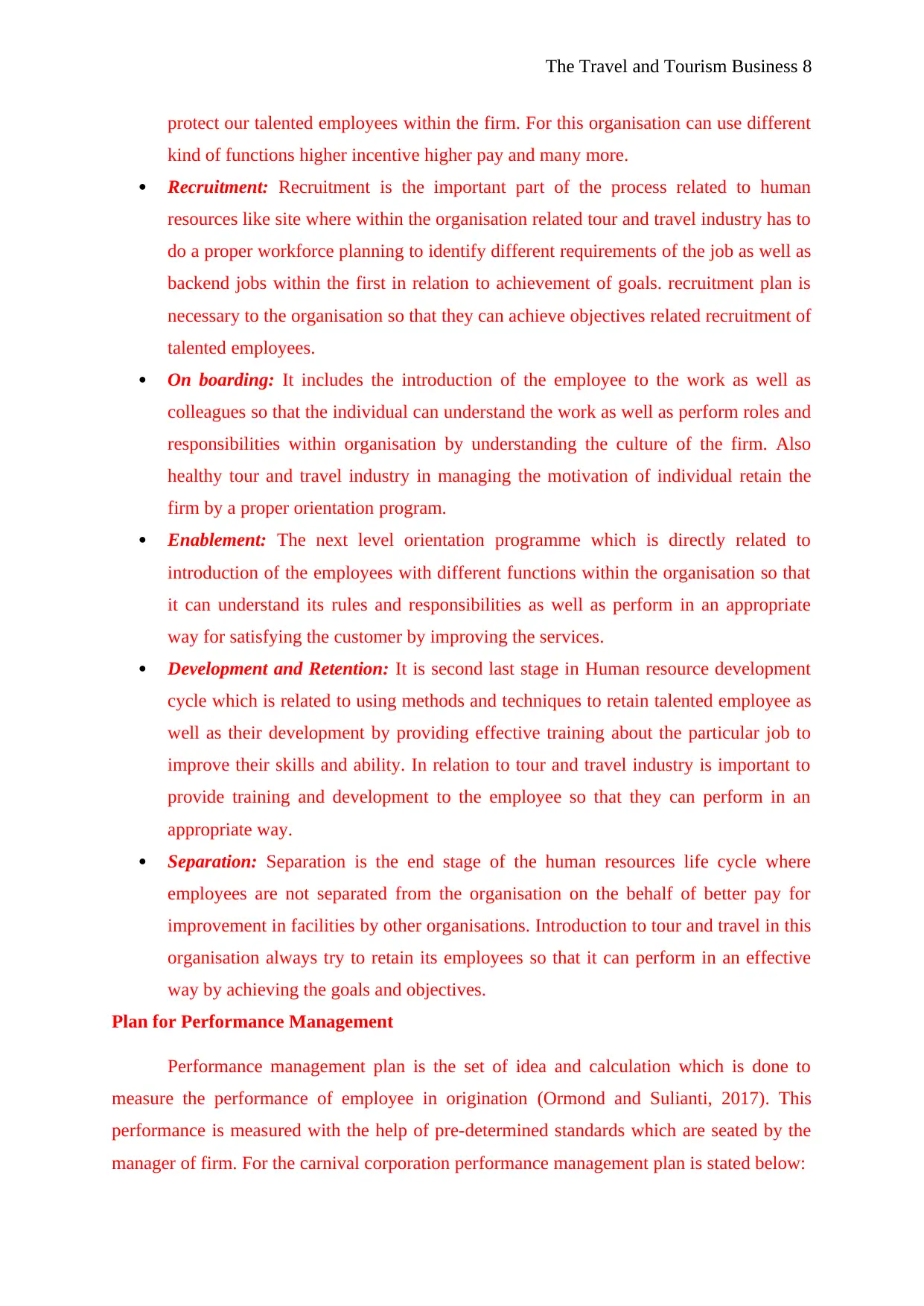
The Travel and Tourism Business 8
protect our talented employees within the firm. For this organisation can use different
kind of functions higher incentive higher pay and many more.
Recruitment: Recruitment is the important part of the process related to human
resources like site where within the organisation related tour and travel industry has to
do a proper workforce planning to identify different requirements of the job as well as
backend jobs within the first in relation to achievement of goals. recruitment plan is
necessary to the organisation so that they can achieve objectives related recruitment of
talented employees.
On boarding: It includes the introduction of the employee to the work as well as
colleagues so that the individual can understand the work as well as perform roles and
responsibilities within organisation by understanding the culture of the firm. Also
healthy tour and travel industry in managing the motivation of individual retain the
firm by a proper orientation program.
Enablement: The next level orientation programme which is directly related to
introduction of the employees with different functions within the organisation so that
it can understand its rules and responsibilities as well as perform in an appropriate
way for satisfying the customer by improving the services.
Development and Retention: It is second last stage in Human resource development
cycle which is related to using methods and techniques to retain talented employee as
well as their development by providing effective training about the particular job to
improve their skills and ability. In relation to tour and travel industry is important to
provide training and development to the employee so that they can perform in an
appropriate way.
Separation: Separation is the end stage of the human resources life cycle where
employees are not separated from the organisation on the behalf of better pay for
improvement in facilities by other organisations. Introduction to tour and travel in this
organisation always try to retain its employees so that it can perform in an effective
way by achieving the goals and objectives.
Plan for Performance Management
Performance management plan is the set of idea and calculation which is done to
measure the performance of employee in origination (Ormond and Sulianti, 2017). This
performance is measured with the help of pre-determined standards which are seated by the
manager of firm. For the carnival corporation performance management plan is stated below:
protect our talented employees within the firm. For this organisation can use different
kind of functions higher incentive higher pay and many more.
Recruitment: Recruitment is the important part of the process related to human
resources like site where within the organisation related tour and travel industry has to
do a proper workforce planning to identify different requirements of the job as well as
backend jobs within the first in relation to achievement of goals. recruitment plan is
necessary to the organisation so that they can achieve objectives related recruitment of
talented employees.
On boarding: It includes the introduction of the employee to the work as well as
colleagues so that the individual can understand the work as well as perform roles and
responsibilities within organisation by understanding the culture of the firm. Also
healthy tour and travel industry in managing the motivation of individual retain the
firm by a proper orientation program.
Enablement: The next level orientation programme which is directly related to
introduction of the employees with different functions within the organisation so that
it can understand its rules and responsibilities as well as perform in an appropriate
way for satisfying the customer by improving the services.
Development and Retention: It is second last stage in Human resource development
cycle which is related to using methods and techniques to retain talented employee as
well as their development by providing effective training about the particular job to
improve their skills and ability. In relation to tour and travel industry is important to
provide training and development to the employee so that they can perform in an
appropriate way.
Separation: Separation is the end stage of the human resources life cycle where
employees are not separated from the organisation on the behalf of better pay for
improvement in facilities by other organisations. Introduction to tour and travel in this
organisation always try to retain its employees so that it can perform in an effective
way by achieving the goals and objectives.
Plan for Performance Management
Performance management plan is the set of idea and calculation which is done to
measure the performance of employee in origination (Ormond and Sulianti, 2017). This
performance is measured with the help of pre-determined standards which are seated by the
manager of firm. For the carnival corporation performance management plan is stated below:
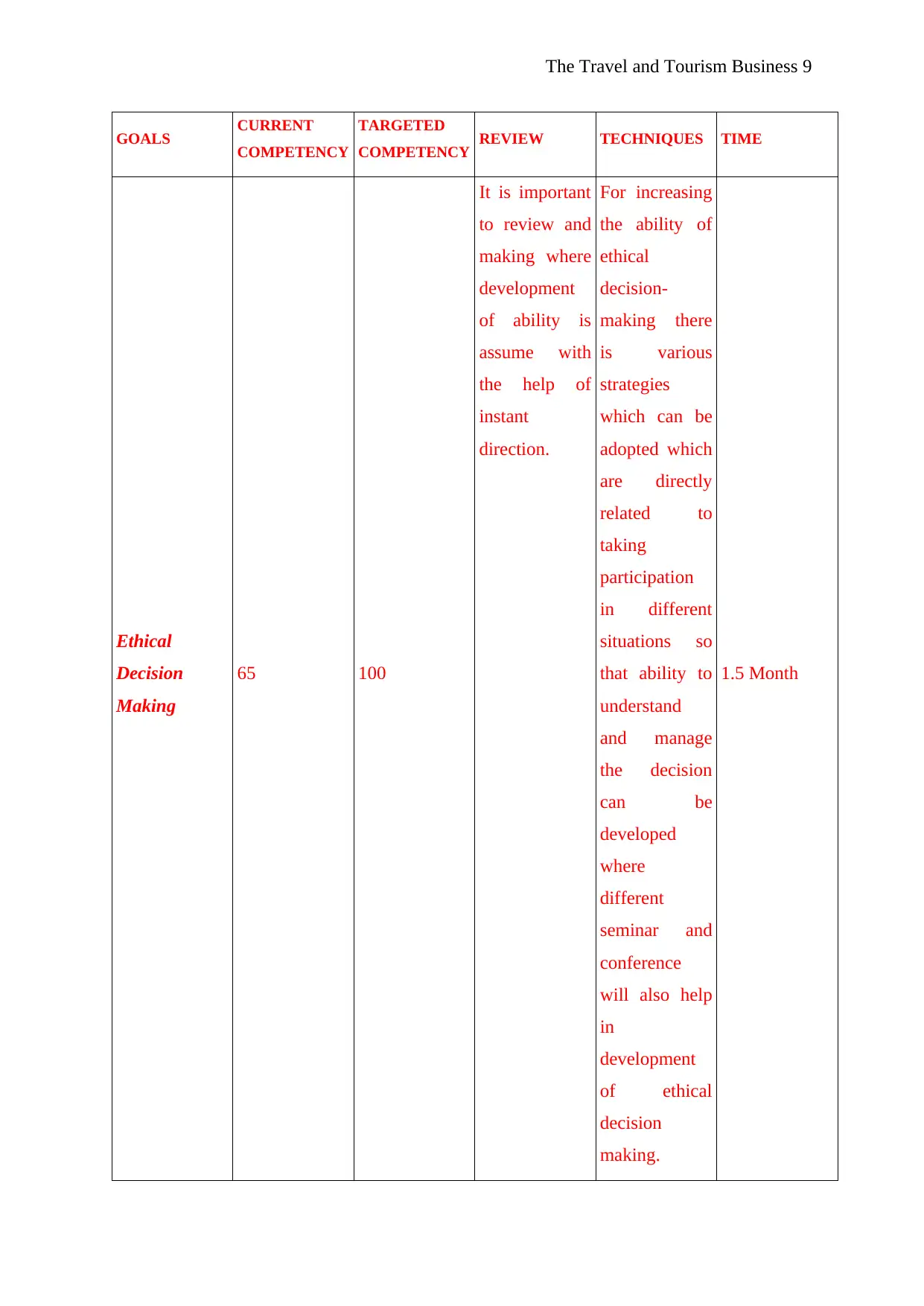
The Travel and Tourism Business 9
GOALS CURRENT
COMPETENCY
TARGETED
COMPETENCY REVIEW TECHNIQUES TIME
Ethical
Decision
Making
65 100
It is important
to review and
making where
development
of ability is
assume with
the help of
instant
direction.
For increasing
the ability of
ethical
decision-
making there
is various
strategies
which can be
adopted which
are directly
related to
taking
participation
in different
situations so
that ability to
understand
and manage
the decision
can be
developed
where
different
seminar and
conference
will also help
in
development
of ethical
decision
making.
1.5 Month
GOALS CURRENT
COMPETENCY
TARGETED
COMPETENCY REVIEW TECHNIQUES TIME
Ethical
Decision
Making
65 100
It is important
to review and
making where
development
of ability is
assume with
the help of
instant
direction.
For increasing
the ability of
ethical
decision-
making there
is various
strategies
which can be
adopted which
are directly
related to
taking
participation
in different
situations so
that ability to
understand
and manage
the decision
can be
developed
where
different
seminar and
conference
will also help
in
development
of ethical
decision
making.
1.5 Month
⊘ This is a preview!⊘
Do you want full access?
Subscribe today to unlock all pages.

Trusted by 1+ million students worldwide
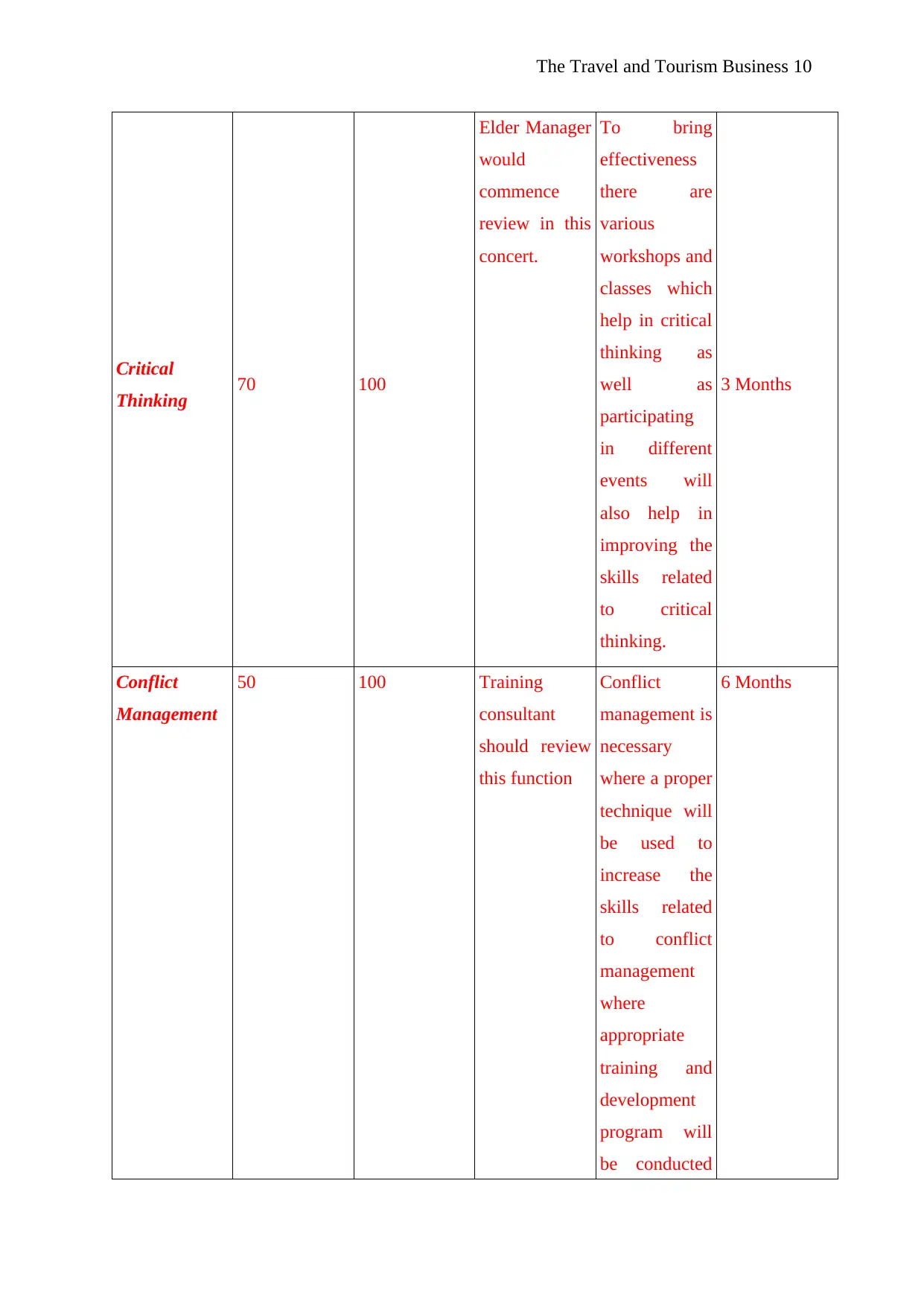
The Travel and Tourism Business 10
Critical
Thinking 70 100
Elder Manager
would
commence
review in this
concert.
To bring
effectiveness
there are
various
workshops and
classes which
help in critical
thinking as
well as
participating
in different
events will
also help in
improving the
skills related
to critical
thinking.
3 Months
Conflict
Management
50 100 Training
consultant
should review
this function
Conflict
management is
necessary
where a proper
technique will
be used to
increase the
skills related
to conflict
management
where
appropriate
training and
development
program will
be conducted
6 Months
Critical
Thinking 70 100
Elder Manager
would
commence
review in this
concert.
To bring
effectiveness
there are
various
workshops and
classes which
help in critical
thinking as
well as
participating
in different
events will
also help in
improving the
skills related
to critical
thinking.
3 Months
Conflict
Management
50 100 Training
consultant
should review
this function
Conflict
management is
necessary
where a proper
technique will
be used to
increase the
skills related
to conflict
management
where
appropriate
training and
development
program will
be conducted
6 Months
Paraphrase This Document
Need a fresh take? Get an instant paraphrase of this document with our AI Paraphraser
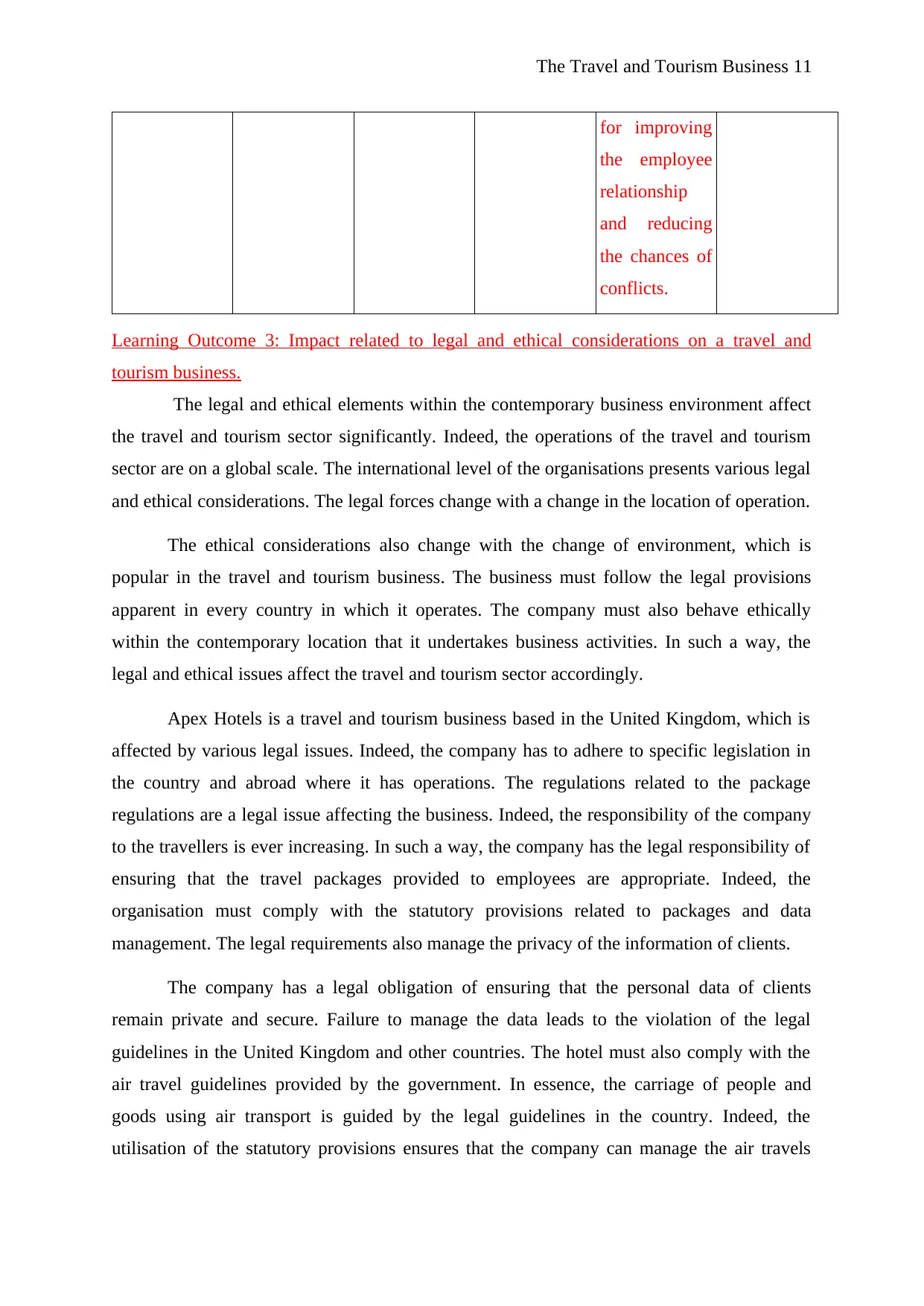
The Travel and Tourism Business 11
for improving
the employee
relationship
and reducing
the chances of
conflicts.
Learning Outcome 3: Impact related to legal and ethical considerations on a travel and
tourism business.
The legal and ethical elements within the contemporary business environment affect
the travel and tourism sector significantly. Indeed, the operations of the travel and tourism
sector are on a global scale. The international level of the organisations presents various legal
and ethical considerations. The legal forces change with a change in the location of operation.
The ethical considerations also change with the change of environment, which is
popular in the travel and tourism business. The business must follow the legal provisions
apparent in every country in which it operates. The company must also behave ethically
within the contemporary location that it undertakes business activities. In such a way, the
legal and ethical issues affect the travel and tourism sector accordingly.
Apex Hotels is a travel and tourism business based in the United Kingdom, which is
affected by various legal issues. Indeed, the company has to adhere to specific legislation in
the country and abroad where it has operations. The regulations related to the package
regulations are a legal issue affecting the business. Indeed, the responsibility of the company
to the travellers is ever increasing. In such a way, the company has the legal responsibility of
ensuring that the travel packages provided to employees are appropriate. Indeed, the
organisation must comply with the statutory provisions related to packages and data
management. The legal requirements also manage the privacy of the information of clients.
The company has a legal obligation of ensuring that the personal data of clients
remain private and secure. Failure to manage the data leads to the violation of the legal
guidelines in the United Kingdom and other countries. The hotel must also comply with the
air travel guidelines provided by the government. In essence, the carriage of people and
goods using air transport is guided by the legal guidelines in the country. Indeed, the
utilisation of the statutory provisions ensures that the company can manage the air travels
for improving
the employee
relationship
and reducing
the chances of
conflicts.
Learning Outcome 3: Impact related to legal and ethical considerations on a travel and
tourism business.
The legal and ethical elements within the contemporary business environment affect
the travel and tourism sector significantly. Indeed, the operations of the travel and tourism
sector are on a global scale. The international level of the organisations presents various legal
and ethical considerations. The legal forces change with a change in the location of operation.
The ethical considerations also change with the change of environment, which is
popular in the travel and tourism business. The business must follow the legal provisions
apparent in every country in which it operates. The company must also behave ethically
within the contemporary location that it undertakes business activities. In such a way, the
legal and ethical issues affect the travel and tourism sector accordingly.
Apex Hotels is a travel and tourism business based in the United Kingdom, which is
affected by various legal issues. Indeed, the company has to adhere to specific legislation in
the country and abroad where it has operations. The regulations related to the package
regulations are a legal issue affecting the business. Indeed, the responsibility of the company
to the travellers is ever increasing. In such a way, the company has the legal responsibility of
ensuring that the travel packages provided to employees are appropriate. Indeed, the
organisation must comply with the statutory provisions related to packages and data
management. The legal requirements also manage the privacy of the information of clients.
The company has a legal obligation of ensuring that the personal data of clients
remain private and secure. Failure to manage the data leads to the violation of the legal
guidelines in the United Kingdom and other countries. The hotel must also comply with the
air travel guidelines provided by the government. In essence, the carriage of people and
goods using air transport is guided by the legal guidelines in the country. Indeed, the
utilisation of the statutory provisions ensures that the company can manage the air travels
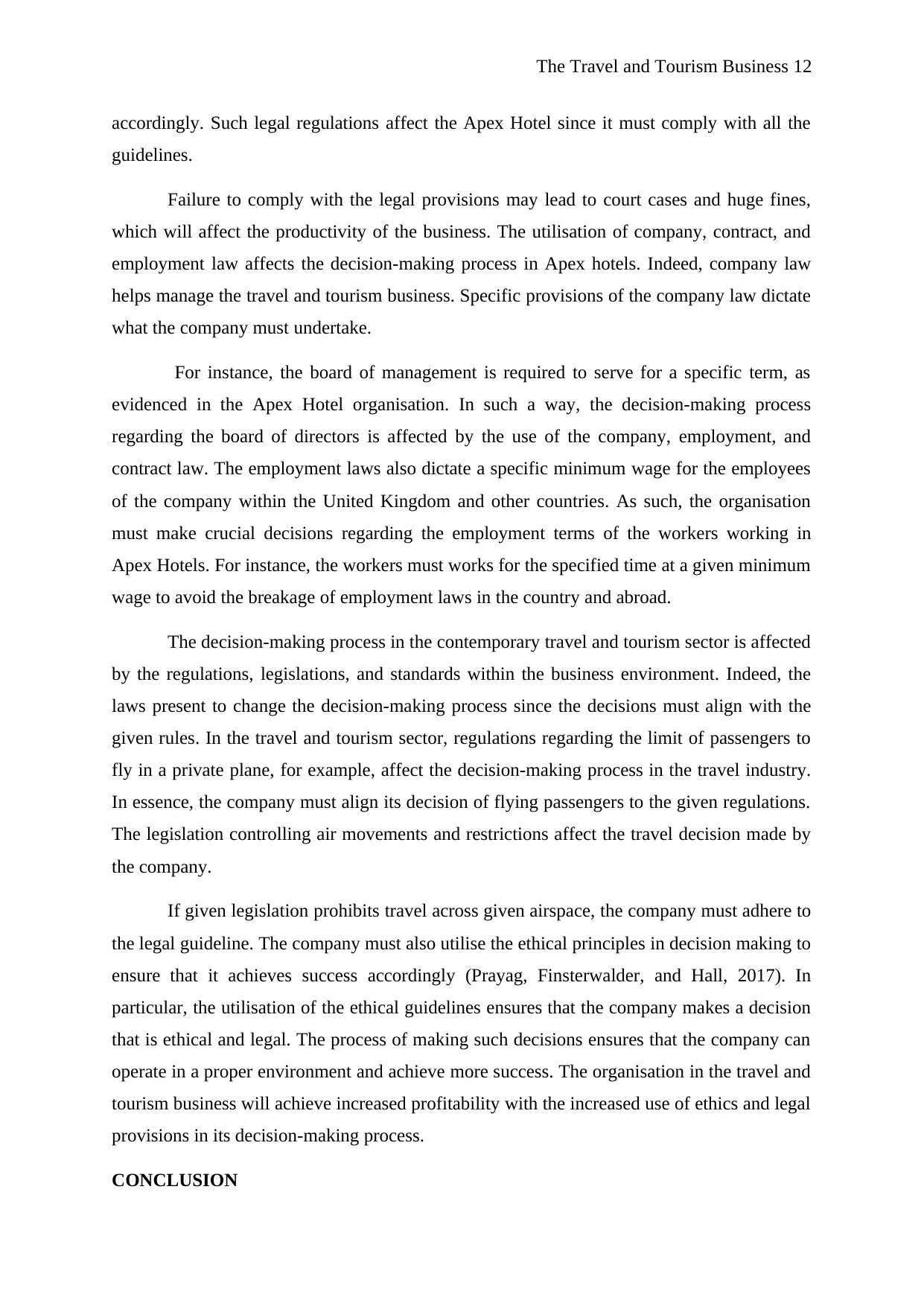
The Travel and Tourism Business 12
accordingly. Such legal regulations affect the Apex Hotel since it must comply with all the
guidelines.
Failure to comply with the legal provisions may lead to court cases and huge fines,
which will affect the productivity of the business. The utilisation of company, contract, and
employment law affects the decision-making process in Apex hotels. Indeed, company law
helps manage the travel and tourism business. Specific provisions of the company law dictate
what the company must undertake.
For instance, the board of management is required to serve for a specific term, as
evidenced in the Apex Hotel organisation. In such a way, the decision-making process
regarding the board of directors is affected by the use of the company, employment, and
contract law. The employment laws also dictate a specific minimum wage for the employees
of the company within the United Kingdom and other countries. As such, the organisation
must make crucial decisions regarding the employment terms of the workers working in
Apex Hotels. For instance, the workers must works for the specified time at a given minimum
wage to avoid the breakage of employment laws in the country and abroad.
The decision-making process in the contemporary travel and tourism sector is affected
by the regulations, legislations, and standards within the business environment. Indeed, the
laws present to change the decision-making process since the decisions must align with the
given rules. In the travel and tourism sector, regulations regarding the limit of passengers to
fly in a private plane, for example, affect the decision-making process in the travel industry.
In essence, the company must align its decision of flying passengers to the given regulations.
The legislation controlling air movements and restrictions affect the travel decision made by
the company.
If given legislation prohibits travel across given airspace, the company must adhere to
the legal guideline. The company must also utilise the ethical principles in decision making to
ensure that it achieves success accordingly (Prayag, Finsterwalder, and Hall, 2017). In
particular, the utilisation of the ethical guidelines ensures that the company makes a decision
that is ethical and legal. The process of making such decisions ensures that the company can
operate in a proper environment and achieve more success. The organisation in the travel and
tourism business will achieve increased profitability with the increased use of ethics and legal
provisions in its decision-making process.
CONCLUSION
accordingly. Such legal regulations affect the Apex Hotel since it must comply with all the
guidelines.
Failure to comply with the legal provisions may lead to court cases and huge fines,
which will affect the productivity of the business. The utilisation of company, contract, and
employment law affects the decision-making process in Apex hotels. Indeed, company law
helps manage the travel and tourism business. Specific provisions of the company law dictate
what the company must undertake.
For instance, the board of management is required to serve for a specific term, as
evidenced in the Apex Hotel organisation. In such a way, the decision-making process
regarding the board of directors is affected by the use of the company, employment, and
contract law. The employment laws also dictate a specific minimum wage for the employees
of the company within the United Kingdom and other countries. As such, the organisation
must make crucial decisions regarding the employment terms of the workers working in
Apex Hotels. For instance, the workers must works for the specified time at a given minimum
wage to avoid the breakage of employment laws in the country and abroad.
The decision-making process in the contemporary travel and tourism sector is affected
by the regulations, legislations, and standards within the business environment. Indeed, the
laws present to change the decision-making process since the decisions must align with the
given rules. In the travel and tourism sector, regulations regarding the limit of passengers to
fly in a private plane, for example, affect the decision-making process in the travel industry.
In essence, the company must align its decision of flying passengers to the given regulations.
The legislation controlling air movements and restrictions affect the travel decision made by
the company.
If given legislation prohibits travel across given airspace, the company must adhere to
the legal guideline. The company must also utilise the ethical principles in decision making to
ensure that it achieves success accordingly (Prayag, Finsterwalder, and Hall, 2017). In
particular, the utilisation of the ethical guidelines ensures that the company makes a decision
that is ethical and legal. The process of making such decisions ensures that the company can
operate in a proper environment and achieve more success. The organisation in the travel and
tourism business will achieve increased profitability with the increased use of ethics and legal
provisions in its decision-making process.
CONCLUSION
⊘ This is a preview!⊘
Do you want full access?
Subscribe today to unlock all pages.

Trusted by 1+ million students worldwide
1 out of 14
Related Documents
Your All-in-One AI-Powered Toolkit for Academic Success.
+13062052269
info@desklib.com
Available 24*7 on WhatsApp / Email
![[object Object]](/_next/static/media/star-bottom.7253800d.svg)
Unlock your academic potential
Copyright © 2020–2026 A2Z Services. All Rights Reserved. Developed and managed by ZUCOL.




